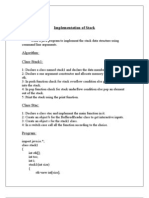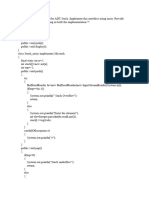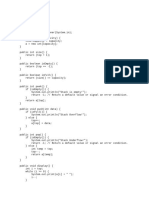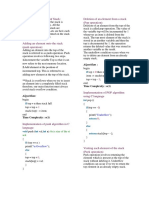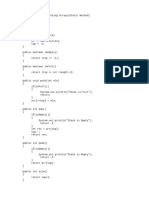0% found this document useful (0 votes)
44 views2 pagesStack Program
This Java code defines a Stack class with methods to create a stack of a given size, push elements onto the stack, pop elements off the stack, check if the stack is full or empty, and print the contents of the stack. It uses a main method to test the stack functionality by prompting the user for operations and handling their input until they choose to exit.
Uploaded by
Pritam PatilCopyright
© © All Rights Reserved
We take content rights seriously. If you suspect this is your content, claim it here.
Available Formats
Download as TXT, PDF, TXT or read online on Scribd
0% found this document useful (0 votes)
44 views2 pagesStack Program
This Java code defines a Stack class with methods to create a stack of a given size, push elements onto the stack, pop elements off the stack, check if the stack is full or empty, and print the contents of the stack. It uses a main method to test the stack functionality by prompting the user for operations and handling their input until they choose to exit.
Uploaded by
Pritam PatilCopyright
© © All Rights Reserved
We take content rights seriously. If you suspect this is your content, claim it here.
Available Formats
Download as TXT, PDF, TXT or read online on Scribd
/ 2







